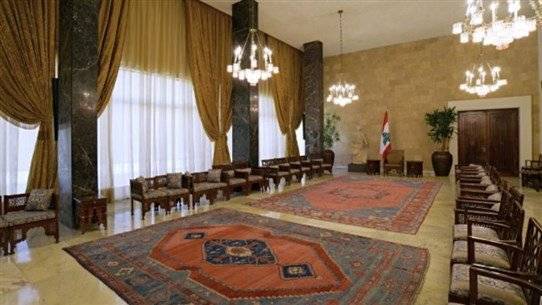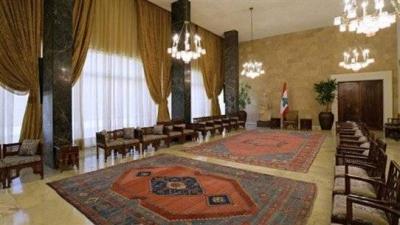A senior ministerial source stated that the fate of the presidential elections being held on time depends on the mission of U.S. mediator Amos Hochstein in reaching a maritime border demarcation agreement between Lebanon and Israel. The source confirmed to "Asharq Al-Awsat" that completing the agreement would pave the way for the presidential election process; otherwise, the chances of electing a new president would be tantamount to postponing the process until after the current president Michel Aoun's term ends on October 31. This would lead the country into choices whose negative repercussions on the internal situation cannot be predicted.
The senior ministerial source, who closely follows the meetings held by the U.S. mediator in Beirut, particularly with the three presidential leaders, noted that it is impossible to separate maritime border demarcation from the presidential election process. He emphasized that the connection between them has become a reality that cannot be overlooked, especially since the issue is no longer limited to local voters, whether they are elites or ordinary voters, but is also related to the developments and international movements surrounding Lebanon.
The source believes that assessing the fate of the presidential elections begins first with the ability of the U.S. mediator to bridge the existing gap between Lebanon and Israel, leading to his facilitation of indirect negotiations between the two countries under the auspices of the United Nations, which are supposed to resume in Naqoura, paving the way for finalizing the maritime border demarcation agreement.
The same source stated that the crux remains in returning to the indirect negotiations in Naqoura, even though the U.S. mediator had sent positive and encouraging signals during his meetings in Beirut before heading to Tel Aviv. However, nothing is final until the last hurdle that is impeding a final agreement is resolved, which depends on the response he will bring from Israel to the Lebanese side. He revealed that communication with the leadership of 'Hezbollah' has not ceased, and that Major General Abbas Ibrahim, the director general of General Security, is responsible for this task, as he is one of the few officials who participated in the meetings held by the U.S. mediator in Beirut.
The source noted that while optimism among state officials regarding reaching a border demarcation agreement is increasing compared to before the U.S. mediator's meetings during his last visit to Beirut, it remains cautious and cannot be relied upon to assume that the demarcation agreement is already within reach, without downplaying the non-final progress achieved by the U.S. mediator.
He confirmed that the unified official position expressed by Presidents Michel Aoun, Nabih Berri of the Parliament, and caretaker Prime Minister Najib Mikati during their meeting with the U.S. mediator has thwarted the exploitation of contradictions and attempts to play on them. He stated that reaching a maritime border demarcation agreement has several political significances that extend beyond the domestic sphere, and Lebanon could benefit from this to transition into a rescue phase, provided that it is supported by an understanding with the International Monetary Fund to help it recover from its catastrophic crises.
The same ministerial source pointed out that merely reaching this agreement means, without a doubt, that the international community has given the green light to begin implementation. Additionally, Iran, which sponsors the resistance axis in Lebanon, is not likely to disrupt or circumvent this process. He said that Tehran, through its ally 'Hezbollah,' may be compelled to send a message to the international community expressing its desire to re-establish communication with the international group.
In this context, a political source mentioned that 'Hezbollah's' launch of drones that flew over the Karish field, accompanied by threats made by its Secretary-General Hassan Nasrallah, comes as part of the pressure to reach a maritime border demarcation. Unless it is meant to convey an Iranian message to those concerned of the need to communicate with Tehran to facilitate reaching this agreement, he stated to "Asharq Al-Awsat" that the upcoming weeks will clarify whether the launch was aimed to present itself as a partner in the victory that may be achieved with the return of the U.S. mediator to Beirut.
The political source noted to "Asharq Al-Awsat" that the delay by President Berri in inviting the Parliament to hold a session to elect a new president just weeks after the start of the constitutional deadline for his election primarily stems from hoping that the border demarcation agreement will materialize before entering the constitutional period, which would pave the way for the election process and thus determine subsequent actions based on the agreement, assuming it occurs as a culmination of international consensus that should extend to the presidential election process.
President Berri has ample time to determine the first date for the presidential election session, ensuring that the intervening period is allocated for achieving the required reforms, without which it would be difficult for Lebanon to obtain a political pass to negotiate with the International Monetary Fund as a step towards its rescue.
Thus, the presidential election process cannot be detached from the border demarcation agreement, especially after the decision was made to close the file on forming a new government, with the alternative being the activation of the caretaker government. This was agreed upon in the recent meeting of the three presidents, considering Mikati's statement that he submitted a ministerial formation, expressing his readiness to consider Aoun's opinions and thoughts and his desire to communicate by requesting to set a meeting date, without receiving any response.
"Asharq Al-Awsat" learned that Aoun placed the responsibility for not setting a date on the director of protocol at the presidential palace, claiming that he did not consult him on the matter. Consequently, the head of the 'Free Patriotic Movement,' MP Gebran Bassil, suffered his first defeat against Mikati, and he is now preparing for a second round as the country approaches the start of the constitutional deadline for the presidential election.




